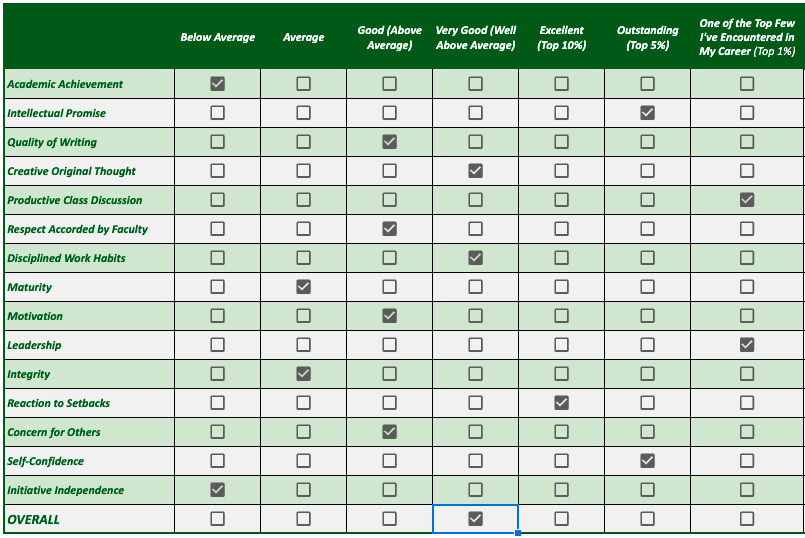Letters of Recommendation
Most students spend a lot of time crafting their application essays and carefully selecting which accomplishments to highlight on their resume, but their letters of recommendation are almost an afterthought. Given the weight they carry with admissions officers at selective colleges however, you should consider your letters of recommendation an equally important part of your application and actually a major opportunity to stand out.
The key is to first understand that the whole purpose of letters of recommendation is to get to know what you are like as a person. To echo Martin Luther King Jr., colleges want to know the “content of your character.”
Why? Because they know your character is as important to your success in college (and life) as your ability to do the work. While there are many ways to understand and evaluate this, colleges ask your recommenders about 16 specific attributes of your character.
Even though somebody else is doing the writing, you have more control over the letters of recommendation than you may realize. If you choose the right recommenders who can illustrate your character, you have the ingredients for a letter of recommendation that sets you apart from other applicants.
Who Should I Ask for Letters of Recommendation?
When you're deciding who to ask for letters of recommendation, think about how a letter of recommendation fits into the rest of your application. Colleges already see your transcript and test scores; they request a list of your extracurriculars, and you've likely written at least one admissions essay. Your letter of recommendation should include information that colleges don't already have.
Recommendations can help us to see well beyond test scores and grades and other credentials and can illuminate such personal qualities as character and leadership as well as intellectual curiosity, creativity, and love of learning. Along with essays, interviews, and other materials in the application, recommendations can offer evidence of an applicant’s potential to make a significant difference to a college community and beyond.
- William R. Fitzsimmons, Dean of Admissions at Harvard University
When you're selecting a recommender, you want to choose someone who knows you personally and can write about your character. While it would be nice if you could choose the people who know you best, colleges often give parameters as to who should write your letters of recommendation. In general, you're going to pick recommenders from these categories:
Your Guidance Counselor
Most colleges explicitly require a letter from your guidance counselor, so they are in a class of their own.
Learn How To Develop a Great Relationship with Your Guidance Counselor
Your Teachers
Colleges vary on this point. Some will give you a number (most ask for 2) and allow you to choose whoever you want. Others will tell you they want to see one from the humanities teacher and another from math or science.
In addition to providing written letters, teachers complete an evaluation like the one below as part of their recommendation on common applications:
Community Members
These are adults you’ve interacted with outside of school, such as through your volunteer work, a part-time job or internship, a coach or mentor who knows you well . Again, some schools encourage you to provide a letter from this category, while others limit your selection to guidance counselors and teachers.
While requirements vary, every college admissions officer wants to see something they don’t already know about you. That means that your recommenders should be able to include anecdotes that demonstrate your character, no matter which category they fall under.
If you’re already an upperclassman, time may be short, but no matter what year you are in high school you can help your recommenders write outstanding letters by demonstrating (or developing) the following aspects of character.
What is Evaluated in My Letters of Recommendation?
When we work with students at Princeton College Consulting, we want to help them develop key aspects of their character – not only because it is important for success in life, but because it is what makes the difference in the admissions office at selective colleges. There are 16 aspects of your character that will be reflected in what is written about you in your letters of recommendation. By cultivating these characteristics, your recommenders will be able to share them naturally in your letter and showcase who you are beyond your numbers and resume.

Academic achievement is about how proactive you are to improve your academic performance. For example, you might go to your teacher anytime you don't get an A to make sure you understand why you missed certain questions (and not just to ask for extra credit!). If you work with a teacher to understand what you missed and you begin to show improvement, your teacher will remember that you went the extra mile to not only earn a better grade, but to master the material.

02 Intellectual Promise

You can start to develop this quality by becoming increasingly curious. If there is a subject you’re interested in, start there and learn more about it outside of what’s being covered in class. As you learn more, you’ll begin making connections in class that other students may not, which allows you to contribute to class discussions in interesting ways or to ask insightful questions. If you’re more reserved, you can ask the teacher individually about what you’re learning and get their guidance on how to take your knowledge to the next level.
No matter what you plan to major in, every college wants to know that you'll be able to express yourself clearly in writing. If you aren't already a strong writer, you have the opportunity to work with your English and Humanities teachers to strengthen your skills. Similar to academic achievement, showing that you want to improve is something that teachers appreciate. This not only can help you craft a better admissions essay, but will inspire your teachers to write a favorable letter, too.


Creativity is a skill that you can develop, like many others on this list. Often, students think of creativity only in terms of artistic ability. While that is certainly one way to demonstrate creativity, you can also exercise it by connecting seemingly disparate ideas or working towards unique solutions. If you are exploring your interests outside of class, think about how you might be able to bring those insights into the classroom. If you notice that your classmates are all struggling similarly, propose a solution that addresses their needs.
Although contributing to class discussions, such as answering the teacher's questions, is a good first step, you’ll want to further the discussion by asking thoughtful and insightful questions. We mentioned earlier that doing outside research can help you bring new insight to the classroom, but another way is to review the scheduled material the day before class. This way you can make a note of anything that you have questions about or would like to explore further, and you can show up to class prepared to contribute in a meaningful way.
.png)

You can earn respect by respecting others first. When you respect your teachers and school administrators, you are mindful that they have lives outside of school and that they are dealing with possibly hundreds of students, which means that you are patient (but persistent) with faculty even when they can’t give you all the attention you ask for. This aspect is also a natural byproduct of working on other qualities on this list.
To demonstrate disciplined work habits, you want to be consistent in the work you turn in, and you want to turn it in on time. Discipline is also evident when you work to improve your academic achievement and come to class ready to contribute to the discussion. Not only do you want to show consistency, but you want to take pride in your discipline as an example for others.

.png)
Maturity is different from what we normally think of as “intelligence”. Most high school students are comparably as “smart” as adults, but maturity has more to do with your emotional intelligence. To start developing your maturity, begin to reflect on situations from other people’s perspectives, whether the situations are inside the classroom or outside of school. Also, ensure you take responsibility for your actions and the impact they have. In addition to self-awareness, maturity is closely tied to motivation, integrity, and discipline.
When students think of improving their academic performance (especially in classes they don't enjoy or that don't come easily to them), many students resign themselves to thinking they just need a good grade in that class to get into college rather than seeing it as an opportunity to develop their character. Being motivated to earn a good grade doesn't impress teachers or admissions officers, but if you view these challenges as part of the process of becoming a better version of yourself, then you'll develop skills and qualities that will help you earn the true respect of your teachers.

%20(1).png)
Formal leadership positions aren't the only way to demonstrate leadership. For example, you can show it through any team-based environment by providing space for everyone to be heard and you can learn how to work through conflicts. If a student isn't pulling their weight in a group project, try alternative approaches such as asking the student about what might help or inspire them to contribute before resorting to speak to a teacher.
Aside from "not cheating" ( we hope you haven't!) integrity is closely tied to honesty and follow-through. Instead of making excuses for why you were late or forgot to complete an assignment, own up to your error, and resolve to do better. When you make a commitment to your teacher or peers to do better, you should follow through on that promise. When people see you take responsibility, and you fulfill your promise, you demonstrate that you are ready for college in ways other students may not.


While much of your application deals with your successes and triumphs, we all learn more from challenges, obstacles, and failures. Whenever you experience a setback, such as a low grade or a personal challenge, it’s important that you don’t let these experiences defeat you. Instead, view them as an opportunity. It’s okay to ask for help when you need it, even with personal challenges as many schools offer resources for students dealing with all kinds of issues. Having a growth mindset and asking for help is a sign of maturity, and it can get you back on track faster than trying to do it alone.
Although high school can be a competitive environment, you can still do well while caring for others. If you see a fellow student struggling with something that you have mastered, you can offer help to that student. It’s important that this be a genuine act, and that you’re not just doing something nice so that you can immediately tell your teacher or guidance counselor that you did this. As you find ways to help others (sometimes as simple as just listening rather than problem-solving), your concern for others will become more evident and your recommenders will pick up on your increased empathy.
.png)

This quality refers to a stable version of confidence, where you aren't overly confident in your abilities and your estimation of them, but you also don't undersell yourself or refuse to acknowledge your strengths. If you struggle with low self-confidence, you can develop confidence in specific areas by working on relevant skills. Things like pre-reading assigned material and developing questions ahead of time can help you feel prepared to ask questions and truly contribute in class. Reflecting on your strengths inside and outside of the classroom can help you feel more comfortable drawing on them to take action towards your goals.
Whether you start a club, a school-wide project, or pursue an interest of yours in ways that other students haven't, this quality means that you don't limit yourself to current opportunities. Instead, you find or create new opportunities when the existing ones don't satisfy your desire. It often starts when you begin to follow your intellectual curiosity and identify ways to put your knowledge into practice.


A general category, this refers to each of the above and more. There are so many important aspects of your character that are straight forward in respect to their desirability, but then there are others – neither good nor bad – except for the way we develop them. For instance, it is not better or worse to be more extroverted or introverted. Much of our character lies in continuing to learn more about ourselves as individuals, leaning into our strengths, and working on the important things that come less naturally. Do this in an authentic way and your recommenders will recognize it.
While it’s important to display these characteristics so teachers can write your recommendation letters, colleges and universities also ask individuals to fill out a matrix similar to the one below.
Compared to other students in his/her class year, how do you rate this student in terms of:

Conclusion
Remember, you don’t have to exude all of the above qualities perfectly. As mentioned earlier, many of these qualities are interrelated, and by working on one, you naturally improve others.
If you begin to be more conscience of these qualities however, you will be in the right mindset to think about developing the many of the associated skills and behaviors in your life. When you do, you'll find that the people in your life will respect you more, and teachers, counselors, and others in your community will gladly agree to write letters of recommendation for you.
By working on these essential aspects of your character, your college applications will be much stronger, and most importantly, you will be more likely to find (or create!) success anywhere you go.
Are you still wondering how to best approach letters of recommendations? Let us help guide you through the process. Our counselors are ready to take the time to work with you on a personalized plan to not only get you great letters of recommendation, but make sure they support the rest of your story that will set your application apart at your top-choice schools.



